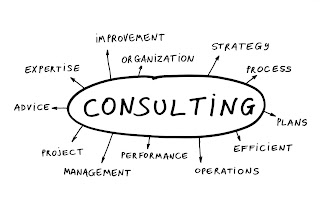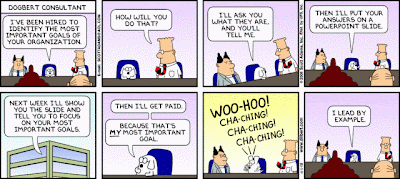As an Executive Director I often wanted to know how well my board and staff understood our organization’s mission and vision, and if they were being clarified well enough. I needed to assess the awareness of my board of how critical their understanding our programs and networking was to the organization and to our position in the community.
Each time I looked over an organization’s financials and fundraising, I found areas needing improving, and fundraising issues that the staff and board had not recognized had changed over time. It was that process of discovery and analysis that helped me revitalize several stagnant nonprofits and help them thrive.
It was the fresh perspective of an outsider that made the difference. In many cases a consultant is hired to show an organization’s leaders what they have been missing and help them make the right changes. Some of the leadership and/or staff may recognize the issues, but may not be able to be the agents for the needed change. Thus, the third-party consultant is engaged. But how do small, struggling under-funded nonprofits afford the rates for an experienced consultant? They can’t, and so they keep struggling through tough organizational issues, ineffective programs, staff turnover, disconnect with the community, and loss of funding as a result. And what are the options for well-run organizations to take an occasional fresh look at their organizational dynamics and leadership?
It was recognizing these issues that led me to create several online assessment tools that provide the data nonprofits need to get the overall view of their organization and start recognizing the needed changes to make. By limiting travel and time of on-site interviews we reduce the cost and still provide a needed summary analysis to help an organization: 1. understand the stage in their life-cycle, 2. examine Staff-CEO-Board relationships, 3. measure their fundraising effectiveness.
 By developing anonymous surveys administered online, I have been able to assist a number of organizations of various age, size and budget. The survey results are graphed for ease of understanding, and a brief, interpretive assessment is provided of potential action steps for further considerations. The next steps are up to your organization’s leadership and funding capabilities. You may decide to engage me or other advisor to help you move forward. In any case, you will have this very important data with which to help change your organization for the better.
By developing anonymous surveys administered online, I have been able to assist a number of organizations of various age, size and budget. The survey results are graphed for ease of understanding, and a brief, interpretive assessment is provided of potential action steps for further considerations. The next steps are up to your organization’s leadership and funding capabilities. You may decide to engage me or other advisor to help you move forward. In any case, you will have this very important data with which to help change your organization for the better.I invite you to take a few moments to examine my website and my background, and the four levels of low-cost assessment analysis tools I offer at jklewis54.wixsite.com/charisnp. Whether you decide to engage my services beyond the surveys is completely up to you. I am available to you to discuss how these can help your organization and help you lead quality change.
Serving together,
James
K. Lewis, m.a.,
ccnl, cfre®











